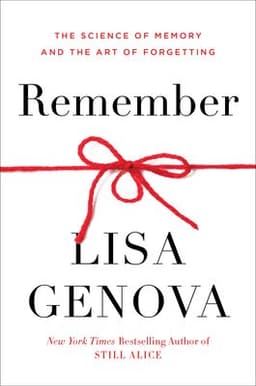
Remember Book Summary
The Science of Memory and the Art of Forgetting
Book by Lisa Genova
Feeling Lazy?Read 1 Minute Summary
Summary
In "Remember", neuroscientist Lisa Genova explores the intricacies of how we create, retain, and retrieve memories, offering fascinating insights and practical strategies to harness the power of your memory while accepting its inevitable imperfections.
Sign in to rate
Average Rating: 4.5
1. How We Remember
Making Memories 101
How memories are made:
- Memories are formed through lasting physical changes in the brain in response to experiences. The process involves four steps:
- Encoding - translating sensory information into neurological language,
- Consolidation - linking related neural activity into a connected pattern,
- Storage - maintaining the neural pattern over time through structural changes,
- Retrieval - reactivating the stored neural pattern to recall the memory.
- The hippocampus is essential for consolidating new consciously retrievable memories by binding together disparate neural activity.
Section: 1, Chapter: 1
The Power Of Attention
Paying attention is crucial for memory formation. Some key insights:
- You can only remember what you pay attention to. Perception alone isn't enough - you must add your attention to encode something into memory.
- Attention acts like a "save button", capturing certain details to be consolidated while the rest is discarded and forgotten. What you pay attention to depends on what you find interesting, meaningful, surprising, emotional, etc.
- Distractions, stress, lack of sleep and excessive screen time all impair attention and memory. To remember more, practice mindfulness, get enough sleep, and limit distractions.
- If you forget something, like where you parked, it's often due to lack of attention, not a memory failure. You never encoded the parking spot in the first place.
Section: 1, Chapter: 2
"Why Did I Come In This Room?"
The author shares a relatable example of walking into her kitchen for her reading glasses, only to instantly forget why she went there. She looked around for cues to jog her memory, but the context of the kitchen provided no relevant clues, so she remained stumped until returning to her bedroom. There, surrounded by the cues present when she first had the thought to get her glasses, like her book on the nightstand, she instantly remembered her glasses again. This illustrates how memory relies heavily on context - we remember best when the context at retrieval matches the context at encoding.
Section: 1, Chapter: 2
The Fleeting Nature Of Working Memory
Chapter 3 covers working memory - the temporary, limited memory store for the present moment.
- Working memory only holds what you're paying attention to right now, for about 15-30 seconds. It's constantly updated as events unfold moment to moment.
- Visual working memory is like a "mental scratchpad" and auditory working memory is like a brief "mental soundtrack" or "echo".
- Working memory has a small capacity, able to hold only about 7 ± 2 "chunks" of information at a time. Chunking information into meaningful units can expand how much you can fit in working memory.
- Important information can be plucked from working memory and consolidated into long-term memory via the hippocampus if it captures your attention. The rest is quickly forgotten as working memory updates.
Section: 1, Chapter: 3
The Magic Number For Working Memory
The capacity of working memory was found to be 7 ± 2 "chunks" of information by researcher George Miller in 1956. A chunk is a meaningful unit of information. Some examples:
- Phone numbers are 10 digits but are chunked into 3 pieces (area code, first 3 digits, last 4 digits), allowing them to fit in working memory
- 12062007 is harder to hold in working memory than 12/06/2007, which chunks the numbers into a memorable date
- The letters "ALMNVYESIGIANEAOSM" exceed working memory capacity, but the same letters chunked as "MY NAME IS LISA GENOVA" are easy to retain
Section: 1, Chapter: 3
Forgetting Yo-Yo Ma's Cello
The author shares the example of celebrated cellist Yo-Yo Ma accidentally leaving his priceless cello in the trunk of a NYC taxi cab. Even for something as important as a $2.5 million instrument, working memory is still fragile. Ma likely forgot the cello because, in his rush, the cello case wasn't in his field of view when he got out of the cab, so there was no visual cue to trigger his working memory to retrieve the cello. This shows how critical cues and context are for memory retrieval. Without them, even the most important things can be forgotten in the heat of the moment.
Section: 1, Chapter: 3
Memory For Skills Vs. Facts
The difference between memory for facts and events vs. memory for skills:
- Declarative memories are consciously recalled facts (semantic memory) and personal experiences (episodic memory). They feel effortful to retrieve and are easy to forget.
- Non-declarative "muscle memories" are unconscious memories for how to perform learned motor skills (typing, bike-riding, playing an instrument, etc). They are automatic and durable, but take a lot of repetition to acquire.
- Muscle memories rely on the basal ganglia and cerebellum to consolidate, not the hippocampus, so they were spared in famous amnesic patient HM who could form new skill memories but no new declarative memories after his hippocampus was removed.
- Both types of long-term memory formation require attention and practice, but muscle memory mastery takes much more repetition than factual or event memory.
Section: 1, Chapter: 4
Becoming An Expert - 10,000 Hours To Greatness
Building on the idea that muscle memory mastery requires extensive practice, the author discusses Malcolm Gladwell's famous "10,000-hour rule" from his book Outliers - that it takes 10,000 hours of deliberate practice to become an expert in any skill.
She relates this to her own history as a dancer, noting that while it may only take 4 hours of practice to master a new dance routine, her ability to do so draws on a lifetime of dance training likely adding up to 10,000+ hours. More practice leads to physical changes in the motor cortex, with more neural territory devoted to the skill. While 10,000 hours isn't a hard and fast rule, the key insight is that exceptional skill comes from a huge amount of focused practice leading to strengthened neural connections.
Section: 1, Chapter: 4
The Wikipedia Of Your Brain
Semantic memory is our memory for facts, the "Wikipedia of your brain". Semantic memories are facts you know without remembering how you learned them, like the capital of France or your birthdate
Acquiring semantic memories requires effortful studying and repetition, ideally spaced out over time vs. crammed. Self-testing is even better than restudying for strengthening semantic memory
Attaching meaning, like with mnemonics (Every Good Boy Deserves Fudge for music notes) or a personal association (Laird Hamilton the surfer is married to volleyball player Gabrielle Reece) makes facts stickier Using visual-spatial memory techniques like memory palaces can drastically improve recall of lists and strings of information in order
Section: 1, Chapter: 5
Your Autobiographical Highlight Reel
We don't remember most of what happens to us, only retaining select fragments of our personal past. Autobiographical memory is the story of your life stitched together from your most meaningful episodic memories. It's highly selective and forms the basis of your identity.
We tend to remember events that are emotional, surprising, personally significant, and self-relevant. The mundane and routine rarely make the cut. Repetition and rehearsal, like retelling stories or looking at photos, strengthens autobiographical memories, but also makes them vulnerable to distortion over time. Each recall modifies the memory.
There is a "reminiscence bump" between ages 15-30 when many of our most vividly remembered autobiographical events occur - likely because of all the memorable "firsts" in those years.
Section: 1, Chapter: 6
Keeping A Diary To Aid Recall
Since we forget the vast majority of our life experiences over time, the author offers some tips for retaining more autobiographical memories:
- Keep a journal - this not only preserves details of your day, but the act of writing aids consolidation and the journal can provide retrieval cues
- Take photos/videos - looking back on these media later helps you relive experiences and retain them longer
- Reflect and reminisce - thinking and talking about memories reactivates them, making them more durable
Section: 1, Chapter: 6
2. Why We Forget
Your Memories Are Probably Wrong
Episodic memories, though often vividly recalled, are highly prone to distortion and inaccuracy. Episodic memories are incomplete from the start because we only encode select details.
During consolidation, memories are frequently edited with elaborations, reinterpretations and flat-out fabrications filled in unconsciously. Memories change a bit each time we recall them based on our current mood, knowledge and beliefs. The altered version overwrites the original in a process called reconsolidation.
In studies, people have been easily manipulated to recall detailed memories of getting lost in a mall, spilling punch on a bride, and seeing footage of 9/11 planes crashing that doesn't actually exist
Section: 2, Chapter: 7
What's The Word On The Tip Of My Tongue?
That frustrating feeling of blanking on a word or name you're sure you know is called a "tip of the tongue" (TOT) experience. It occurs when there's only partial activation between the concept you're searching for and it's name/label.
- It happens to all ages but increases after age 40 due to slower neural processing. TOT becomes more noticeable and worrisome to older adults.
- Proper names are the most common targets of TOT because, unless meaningful to you, they lack semantic associations in the brain (the "Baker/baker paradox")
- Cues like seeing/hearing the first letter or number of syllables sometimes slip through during TOT. An "ugly sister" - a similar-ish but wrong word - may also come to mind
Section: 2, Chapter: 8
Minimizing Awkward Name Lapses
The author offers tips for avoiding or quickly resolving the awkward social gaffes caused by forgetting names:
- Pay attention when first hearing the name. Many name lapses aren't true forgetting but rather a failure to encode the name initially due to distraction or disinterest.
- Repeat the name aloud: "Nice to meet you, Sarah." Hearing your own voice say it boosts encoding.
- Make the name meaningful. Sarah > has red hair like your sister Sarah, sell seashells by the seashore, dated Sam in high school, etc. Attach personal, visual or memory palace-style associations.
Section: 2, Chapter: 8
Remembering To Remember
Prospective memory - remembering what you need to do later. It relies on external cues (time-based like a 2pm meeting or event-based like buying milk when you see the store) to trigger recall of the intended action. It has two components:
- forming the initial intention and
- retrieving it at the right time. Failure is common in both steps.
It's more of a "forgetting" system than a memory system. Up to 70% of daily memory lapses are prospective memory failures. Prospective memory declines with age but is also error-prone in youth, with 50% of 20-somethings forgetting to do an action just 2 hours later in one study
Section: 2, Chapter: 9
Hacks For Remembering Future Tasks
Since prospective memory is so flaky, the author provides some practical tips for overcoming this all-too-common weakness:
- Write it down. Put the task on your to-do list, calendar or phone.
- Make specific plans with salient cues. Vague intentions like "I'll exercise sometime today" rarely happen. But "I'll go for a run in the park at noon" is more likely to stick.
- Use visual cuing. Want to remember to take the cookies to the party? Put them on top of your car keys so you can't miss them when it's time to go.
- Set alarms/reminders, especially if your routine is disrupted.
Section: 2, Chapter: 9
The Insidious Erosion Of Memory By Time
Chapter 10 dives into the unavoidable fading of memories over time, a phenomenon first scientifically studied by Hermann Ebbinghaus in the 1800s. His famous "forgetting curve" shows that memory loss happens rapidly at first, then tapers off, with about 25% of the original material retained in the long run if there's no further review.
This forgetting occurs because the neural connections housing the memory physically decay if not reactivated. However, some residual trace remains - relearning forgotten material goes faster than the first time, a "savings" effect.
To combat time's memory-eroding effects, repeated retrieval of the memory is key, preferably spaced out over time vs. crammed. Overlearning, continuing to study even after you can accurately recall it, also helps cement long-term retention.
Section: 2, Chapter: 10
The Critical Role Of Meaning In Memory
The author highlights how meaning and emotion influence what our brains choose to remember or let fade away:
- Meaningful memories are stickier than neutral ones. We forget most of life's routine details (what we ate for lunch last Tuesday) but remember meaningful or emotional events (a great trip) for years.
- Attaching personal significance to information makes it easier to learn and retain.
- Mnemonics work because they make nonsense meaningful.
- Memories linked to strong emotions like fear, joy, grief, or love are more vivid and long-lasting, even if details drift over time.
- Memory has a "positivity bias," preferentially storing and recalling positive memories and associations over negative ones to maintain our rosy self-image.
Section: 2, Chapter: 10
Intentional Forgetting - Letting Go Of Memories On Purpose
Chapter 11 explores how forgetting isn't always a passive, uncontrolled process - we can actively choose to forget things we don't want to retain, though it's not always easy. Unwanted thoughts and memories can be intentionally suppressed by redirecting attention whenever they come to mind, depriving them of the rehearsal needed to solidify long-term storage.
In many everyday situations, some strategic forgetting is beneficial. Truly traumatic, intrusive memories are much harder to shake, but working with a therapist to reframe them into less devastating terms during reconsolidation may lessen their sting. Memory and forgetting have a yin-yang relationship - both are essential for a healthy, well-functioning mind.
Section: 2, Chapter: 11
Healthy Habits To Slow Brain Aging
Although some age-related memory decline is inevitable, adopting brain-healthy habits can significantly reduce your risk of debilitating impairment or dementia:
- Exercising regularly, both aerobically and with strength training. Exercise improves circulation and neuroplasticity and may stimulate the birth of new neurons.
- Following a Mediterranean-style diet rich in vegetables, fruit, fish, olive oil, nuts, and whole grains while minimizing red meat, sugar, and processed foods. These nutrients reduce inflammation and other damage to brain cells.
- Staying intellectually engaged by learning new skills, taking classes, reading challenging books, and maintaining social connections. Keeping your brain active helps build "cognitive reserve" that protects against Alzheimer's.
- Getting 7-9 hours of sleep per night. Sleep deprivation impairs focus, torpedoes memory consolidation, and allows toxic plaques to build up.
Section: 2, Chapter: 12
3. Improve Or Impair
Put It In Context - How Contextual Cues Trigger Memory
Memory retrieval depends heavily on context - the external environment and internal state present when a memory was formed.
Memories are easier to recall when the context at retrieval matches the context at encoding. This applies to place, time, people, and even internal states like mood, hunger or caffeine levels. Conversely, being in a different context than where you learned something can impair recall.
To leverage this, study under conditions similar to the test. Drink coffee while studying and testing. Recall what you learned in the same room. Context matters!
Section: 3, Chapter: 14
Stressed Out - How Acute and Chronic Stress Impact Memory
Chapter 15 details the complex effects of stress on memory formation and retrieval.
- Acute stress causes release of hormones epinephrine and cortisol, which signal the amygdala to activate the hippocampus to consolidate the stressful event as a memory. This prioritizes storage of important, survival-relevant information.
- An optimal amount of acute stress improves attention and memory formation. Too little stress and consolidation isn't boosted.
- Chronic stress leads to prolonged cortisol release, impairing the hippocampus and its ability to form new memories. It can even cause hippocampal neurons to wither and die.
- Techniques like meditation, exercise, yoga and reframing negative thoughts can reduce perceived stress and protect the brain from its memory-harming effects.
Section: 3, Chapter: 15
Sleep On It - How Sleep Is Critical For Memory
Sleep is one of the most important factors for forming and retaining memories for the long term:
- During sleep, the brain replays and strengthens neural connections that were active during learning. This aids consolidation of new memories.
- Lack of sleep impairs attention the next day, making it harder to encode new memories. It also prevents the full benefits of rehearsal and practice from taking hold.
- Naps can boost memory as well. A 20-minute nap after learning something new can provide significant memory enhancement without the grogginess of longer naps.
- Most importantly, chronic sleep deprivation is a major risk factor for Alzheimer's. During deep sleep, the brain clears out the amyloid protein that can lead to dementia.
Section: 3, Chapter: 16
The Paradox of Memory - Both Everything and Nothing
Chapter 18 presents a philosophical perspective on the importance of memory, acknowledging both its centrality and its flaws. The healthiest approach is to hold memory as both "everything and nothing."
- On one hand, our memories make us who we are, allowing us to learn, grow, and connect with others. Valuing memory motivates us to keep it sharp and treasure the meaningful moments.
- On the other hand, putting too much stake in memory sets us up for disappointment, since it is inevitably imperfect, changeable and prone to distortion. Even the best memory sometimes fails.
- A balanced view is to take memory seriously but hold it lightly. Use tools to improve and preserve it but accept its inherent limitations. Don't catastrophize when it fails.
Section: 3, Chapter: 18
Famous Failures - When Exceptional Memories Make Mistakes Snippet Type: Case Study/Example
Consider these examples of how even people with extraordinary memory abilities still forget and make mistakes, illustrating memory's imperfections:
- Akira Haraguchi, who memorized over 100,000 digits of pi, still forgot his wife's birthday.
- Legendary cellist Yo-Yo Ma once left his priceless cello in a New York City taxi.
- World memory champion Joshua Foer, who can memorize a deck of cards in under 2 minutes, admits these techniques don't make him immune to forgetting why he walked into a room.
- These anecdotes demonstrate that even the most exceptional memories aren't infallible or all-encompassing. Mistakes and lapses can happen to anyone - it's only human.
Section: 3, Chapter: 18
Related Content
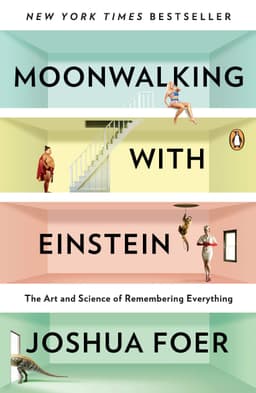
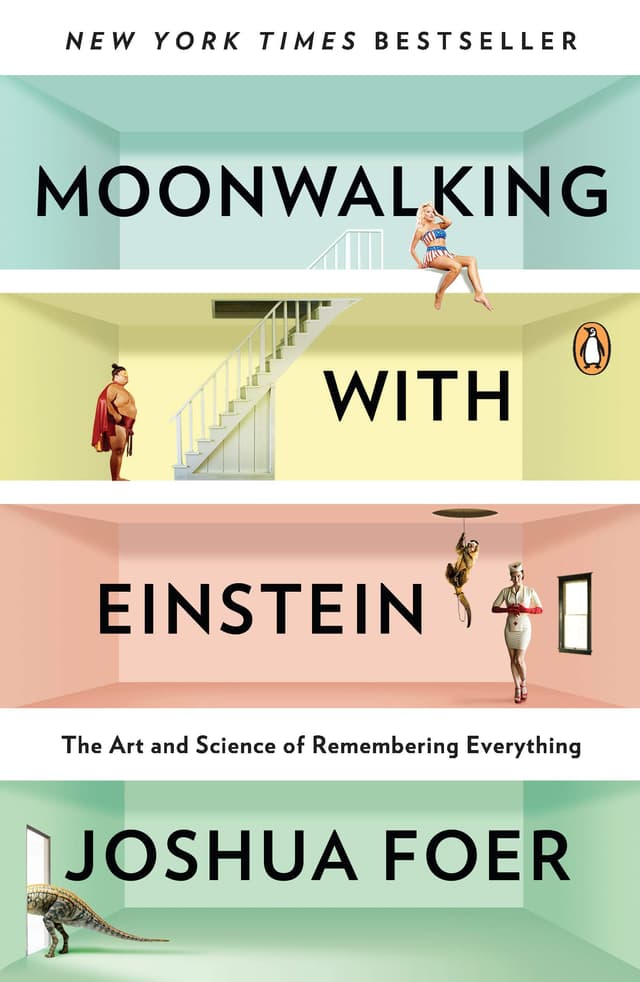
Moonwalking with Einstein Book Summary
Joshua Foer
Joshua Foer chronicles his journey from covering the U.S. Memory Championship as a journalist to becoming a competitor and ultimately winning the event himself, all while exploring the history, science, and techniques of memory training and the untapped potential of the human mind.
Joshua Foer chronicles his journey from covering the U.S. Memory Championship as a journalist to becoming a competitor and ultimately winning the event himself, all while exploring the history, science, and techniques of memory training and the untapped potential of the human mind.
Memory
Psychology
Learning
Personal Development
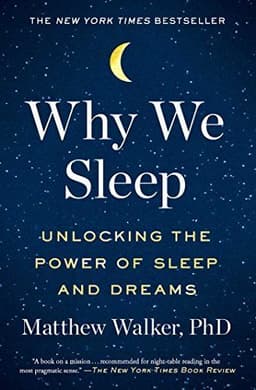
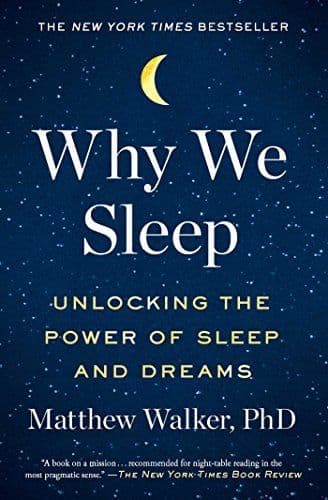
Why We Sleep Book Summary
Matthew Walker
Sleep is the single most effective thing we can do to reset our brain and body health, yet we are in the midst of a global sleep loss epidemic that is decimating our health, longevity, productivity. Prioritizing sleep is can improve virtually every aspect of our lives, and this book provides the scientific evidence and practical strategies to make it happen.
Sleep is the single most effective thing we can do to reset our brain and body health, yet we are in the midst of a global sleep loss epidemic that is decimating our health, longevity, productivity. Prioritizing sleep is can improve virtually every aspect of our lives, and this book provides the scientific evidence and practical strategies to make it happen.
Sleep
Health
Personal Development

